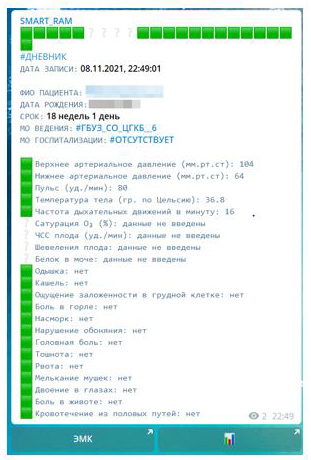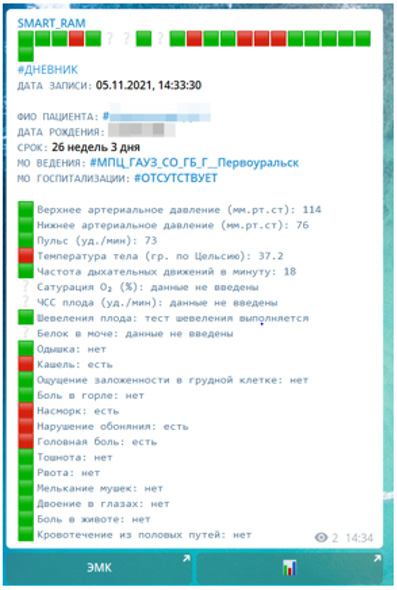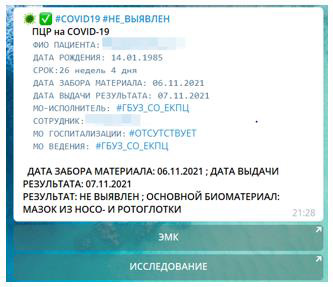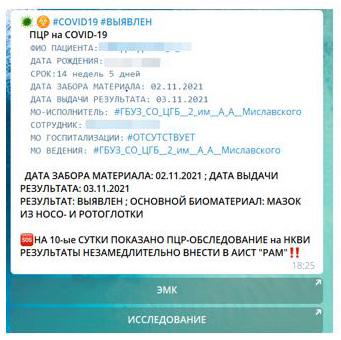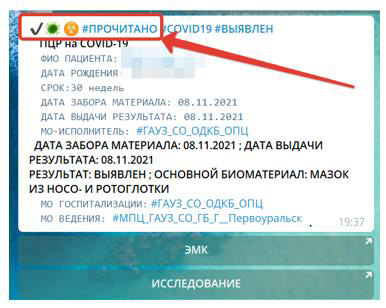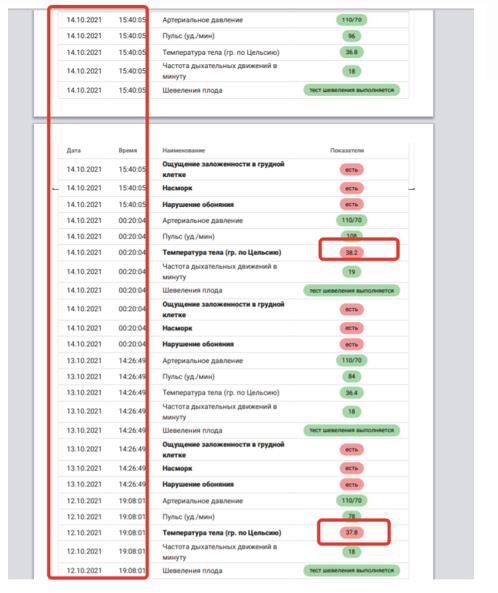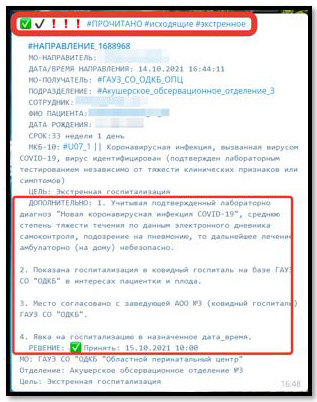ABSTRACT
The article presents the practical application of telemedicine information technologies that have allowed maternity institutions of the Sverdlovsk region to carry out remote monitoring the health of pregnant women and maternity hospitals, including during outpatient treatment (at home) with asymptomatic and mild COVID-19.
Keywords: Information Technologies; Telemedicine; Remote Health Monitoring; Healthcare; Maternity Care; Referral; Routing; Pregnant Woman’s Personal Account; COVID-19; Electronic Diary of Self-Monitoring of Health
The Role of Remote Technologies in the Quality Management System and Safety of Medical Care
On April 26, 2021, Deputy Chairman of the State Duma Irina Yarovaya at a meeting of the Presidium of the Council of Legislators of the Russian Federation under the Federal Assembly of the Russian Federation called for simplifying the exchange of data between medical institutions and patients. In the Sverdlovsk region, an automated information system of mobile notifications «AIST_SMART» for pregnant patients and doctors began to operate. Using a smartphone or, say, a tablet, pregnant patients in their personal account get the opportunity to keep an electronic diary of self-control of their health. The diary has the functions of automatic interpretation of the results and the formation of signal information for the obstetrician-gynecologist. Now pregnant women do not need to fill out paper diaries of self-control, call their doctor or the reception of the antenatal clinic or wait for a doctor’s call in order to report the results - the process is fully automated. The women’s consultation received an IT tool for remote interaction with pregnant women and women in child child. The introduction of «AIST_SMART» technologies made it possible to replace paper diaries with electronic ones. Medical data of the patient are collected in a single database and allow you to track the dynamics of the patient’s health around the clock. The results of electronic diaries are automatically processed by the system and if no abnormalities are detected, the data is simply recorded in the system and does not disturb the doctor (Figure 1).
In case of detection of deviations in the patient’s state of health, the system marks the identified deviations and sends a notification to the doctor about the current state (Figure 2). Mobile notifications instantly convey accurate and detailed information about the patient’s state of health and thus contribute to the timely decision on hospitalization in case of detection of criteria for weighting the course of NCVI. All notifications in case of deviations are automatically sent to the attending physician and the doctor in the Obstetric Remote Consultation Center (hereinafter referred to as the ADCC) for the routing of the patient 24/7. Remote health monitoring functions as follows.
Figure 2: The data of the expanded diary of self-control at COVID-19 with deviations in the state of health.
Registration in the System «AIST_SMART»
To register the patient in the personal account at the initial appointment of a pregnant patient, a consent-instruction [1] is issued to connect to the mobile service «AIST_SMART» with an individual QR code. At home, the patient reads the QR code using the camera of her smartphone or tablet and, according to the instructions, undergoes the registration procedure, forming a digital four-digit PIN-code. From now on, it is guaranteed 24/7 technical support. The QR code serves as the patient’s identifier and the link between her electronic medical record (EHR) in the AIST «RAM» and the personal account in the «AIST_SMART» system. To register a doctor in your personal account, you must log in to the medical information system - AIST «RAM», in which all medical personnel of the obstetric service in the region work. Open the «Personal Account» tab and register by scanning an individual QR code. So, in order to access electronic self-control diaries, the doctor and the patient connect to the AIST_SMART service, and after registering in the system, notifications about the results of remote health monitoring will be received on their mobile device. The doctor does not need to call on the phone to find out how she feels, what her temperature is, the symptoms of SARS, etc.
How the Mobile Alert System Works
Formation of Notification of the Result of Self-Control Diaries
This process is fully automated. AIST_SMART performs the role of an intellectual assistant to the obstetrician-gynecologist/ midwife. The patient fills in the diary data, and the doctor receives ready-made results with automatic interpretation. Now the patient will not forget to call the antenatal clinic, and the doctor will be able to make decisions on the tactics of conducting comprehensively, taking into account the results of the patient’s home self-control and his obstetric status.
Patients with COVID-19 are Asymptomatic/Mild and Receiving Care on an Outpatient Basis (at home)
Upon receipt of the results of testing in a pregnant woman / maternity for COVID-19, the data are entered by medical personnel in the AIST «RAM». Notifications about the results are automatically generated in the personal account «AIST_SMART» (Figures 3 & 4). These notifications are automatically sent to both the patient and the doctors. With what there is control that the patient is also informed about the result (Figure 5). If a positive result is detected on the COVID-19, the patient receives notifications 2 times a day about the need to fill out a self-control diary, which is also informed by the doctor - full feedback (Figure 6). The doctor of the ADC, based on the results of the self-control diary (Figure 7) and obstetric status according to the data in the electronic medical record (hereinafter referred to as the EHR) in the AIST «RAM», where there is information about all the results of the examination, the course of pregnancy and diagnoses, decides on further management tactics: to continue outpatient treatment or hospitalization in a covid hospital. The ADCC doctor fixes his decision in the EHR, making out a remote consultation for the attending physician of the antenatal clinic or obstetric hospital (if the patient is in the hospital at the time of detection of the COVID-19).
Figure 6: Mobile notification that a reminder has been sent to the patient to complete a self-monitoring diary.
If a decision is made on the need for hospitalization, the doctor of the ADC through a confidential «working» chat in AIST_SMART can contact the patient and clarify her consent to hospitalization and the possibility of transportation by personal transport. If consent is obtained (Figure 8), the ADC doctor makes an additional referral for (re-) hospitalization to a particular covid hospital for pregnant women and women in childcare, taking into account available places. The patient receives a notification about the referred referral indicating the covid hospital, the date and time of hospitalization (Figure 9). If it is necessary to organize transportation, the doctor of the ADC has resources through communication with the medical organization where the patient is on the dispensary register and agreeing on the method and time of transportation by the NSR team in compliance with epidemiological rules (Figure 10).
You do not Need to Receive a Paper Direction
If necessary, you can print the direction at the place of treatment of the patient, using a single information space of the regional obstetric monitoring of AIST «RAM». All the directions that a woman received during pregnancy are reflected in her personal account in the «My directions» section. The patient can open any document, even if the connection with the internet has disappeared.
Advantages of Remote Monitoring of Health
The transition to electronic diaries of self-control allows you to identify the weighting of the course of ARVI / ARI in the case of outpatient treatment (at home) with COVID-19, and timely send the patient to hospitalization to prevent adverse events, which is from the main directions of the quality management system and safety of medical care. AIST_SMART allows you to create constant feedback [2] with the patient and thereby form a patient-centric model of care as one of the priority areas for the development of modern medicine and healthcare in general. All of the above increases the compliance of doctor-patient interaction and directly affects the quality and safety of medical care in the difficult conditions of the NCVI pandemic, which meets the modern needs of society and solves the tasks set by the Government of the Russian Federation in the field of digitalization of healthcare [3-8].
Figure 10: Finding out the possibilities of transportation and hospitalization to the covid hospital through a confidential “working” chat in AIST_SMART.
Conflict of Interest
No conflict of interest with any institution/organization.
References
- Federal Law of 21.11.2011 No. 323-FZ “On the Basics of Protecting the Health of Citizens in the Russian Federation”.
- Temporary methodological recommendations of the Ministry of Health of the Russian Federation "Organization of medical care for pregnant women, women in labor, maternity women and newborns with a new coronavirus infection COVID-19". Version 4 (05.07.2021).
- https://www.zdrav.ru/articles/4293663431-lichnyy-kabinetaistsmart-dlya-beremennyh-i-vrachey-s-mobilnymi-21-m10-20-qqqzg21.
- https://www.oblgazeta.ru/society/health-care/125827/ .
- https://evercare.ru/news/mobilnaya-sluzhba-opovescheniyaaistsmar.
- https://jtelemed.ru/article/avtomatizacija-processa-vyjavlenija-uberemennyh-zabolevanija-covid-19.
- Order of the Ministry of Health of the Russian Federation No. 965n dated 30.11.2017 “On approval of the procedure for the organization and provision of medical care using telemedicine technologies”
- https://smarteka.com/practices/licnyj-kabinet-aist-smart-s-mobilnymi-uvedomleniami.

 Short Communication
Short Communication